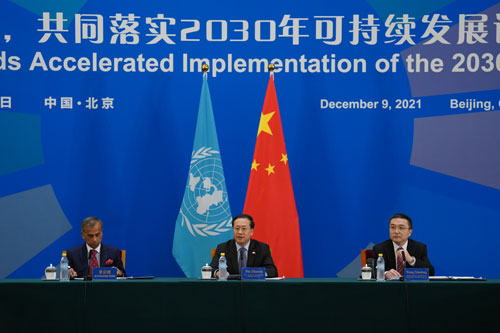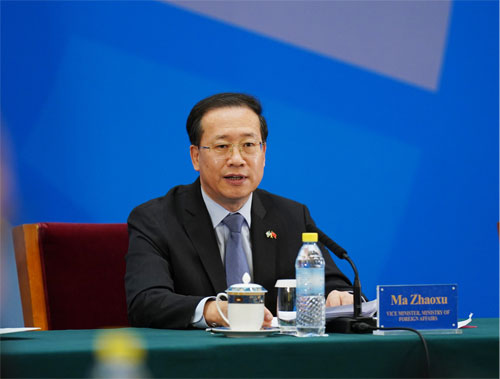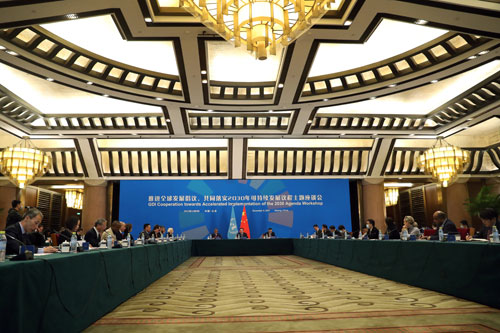
People’s Republic of China



On December 9, 2021, Vice Foreign Minister Ma Zhaoxu attended the opening ceremony of the Workshop on GDI Cooperation towards Accelerated Implementation of the 2030 Agenda and delivered a speech. The Workshop was co-chaired by Director-General of the Department of International Economic Affairs of the Foreign Ministry Wang Xiaolong and Resident Coordinator of the UN Development System to China Siddharth Chatterjee, and attended by representatives from relevant UN development agencies in China and relevant Chinese departments.

Ma Zhaoxu said, President Xi Jinping proposed the Global Development Initiative (GDI), calling for the international community to strengthen global development partnerships and accelerate the implementation of the 2030 Agenda, aiming at more robust, greener and more balanced global development. GDI is an initiative put forward by China to support the development of developing countries, promote global economic recovery in the post-pandemic era and strengthen international development cooperation. The GDI gives top priority to development, and aims to address the special needs of developing countries. Bearing in mind the acute challenges and emerging opportunities in global development, the GDI identifies eight priority areas of cooperation, charting feasible pathways for accelerating the implementation of the 2030 Agenda. The GDI, in keeping with the 2030 Agenda, calls for stronger global development partnership, supports the United Nations in playing an overall coordinating role in the implementation of the 2030 Agenda, and promotes multilateral development cooperation processes, thus contributing to the realization of the Sustainable Development Goals. The GDI is anchored on the principle that no country and no one should be left behind, and committed to bridging the north-south gap and eradicating inequality within countries.
Ma Zhaoxu said, within just two months since it's proposed, the GDI has been warmly welcomed and acclaimed by the international community. The GDI has been highly commended by all parties on a series of multilateral occasions, including the Eighth Ministerial Conference of the Forum on China-Africa Cooperation, the China-Pacific Island Countries Foreign Ministers' Meeting, the ASEAN-China Special Summit to Commemorate the 30th Anniversary of ASEAN-China Dialogue Relations, and the Third Ministers' Meeting of the China-CELAC Forum. This is a testament that the GDI represents what developing countries really want, and meets the common aspiration of the international community to accelerate the implementation of the 2030 Agenda.
Ma Zhaoxu stressed that this year marks the 50th anniversary of the restoration of New China's lawful seat in the UN. As the largest developing country, China has made development its top priority of governance, fully committed to the philosophy of people-centered development, prioritized and actively participated in the work of the UN in economic and social development. China has been among the first countries to meet the UN Millennium Development Goals and has taken the lead in implementing the 2030 Agenda. For the first time in history, China eliminated absolute poverty, accounting for over 70 percent of poverty reduction worldwide, and made an important contribution to global development. By proposing the GDI, China intends to call on the international community to support the work of the UN and to place development at the core in the global macro-policy framework, in order to accelerate the implementation of the 2030 Agenda.
Ma Zhaoxu stressed that Secretary-General Antonio Guterres said that the UN completely supports the GDI and stands ready to cooperate with China on its implementation. The GDI provides important new opportunities for cooperation between China and the UN, in particular the UN Development System. China is ready to work with the UN and advance the GDI. First, focus on development. It is much anticipated that all development agencies commit to their role and mandate in expediting the implementation of the 2030 Agenda, and participate in GDI cooperation with a view to promoting global development. Second, maximize synergy. China hopes UN development agencies could, bearing in mind the pressing needs of the developing countries, work closely with global, regional and sub-regional multilateral cooperation mechanisms, to create a broad network of global development partnerships and take forward the 2030 Agenda. Third, deepen cooperation. China hopes development agencies could carry out cooperation projects in priority areas of the GDI. Fourth, reinforce coordination. The Chinese Foreign Ministry will continue to support development agencies in carrying out their operations in China, and explore new areas and modalities of cooperation with all parties under the GDI framework for win-win results.
Siddharth Chatterjee and representatives of UN development agencies in China participating in the Workshop spoke highly of China's remarkable achievements in the implementation of the 2030 Agenda and welcomed and supported the GDI proposed by President Xi Jinping. All parties agreed with the concept of giving top priority to development and putting people first, and highly praised the eight priority areas of cooperation identified in the GDI. All parties agreed that the implementation of the 2030 Agenda has suffered major setbacks due to COVID-19, and countries face severe challenges in achieving the Sustainable Development Goals. At this critical juncture, China proposed the GDI to accelerate the implementation of the 2030 Agenda, which will inject new impetus into global development.
Representatives of development agencies at the Workshop said that the GDI is highly aligned with the priorities and strategies of each agency, and they are ready to make full use of their resources, expertise and partnership network to support the implementation of the GDI from the headquarters and representative offices in China. All development agencies, considering their current work priorities, discussed the starting point and the specific measures to advance the GDI from poverty reduction, food security, green transformation, clean energy, cooperation against the pandemic, industrialization, digital economy, connectivity and other fields. They also put forward some working ideas and concepts on deepening South-South cooperation and tripartite cooperation to advance the GDI. All parties agreed to move forward with the GDI and hold another workshop and other activities at an appropriate time to pool wisdom, build consensus and take practical actions to ensure steady and long-term progress of the GDI and contribute to the implementation of the 2030 Agenda.

The Workshop, co-hosted by the Ministry of Foreign Affairs of China and the Office of the Resident Coordinator of the UN Development System to China, aims to have in-depth exchanges and propose cooperation ideas and measures to advance the GDI and accelerate the implementation of the 2030 Agenda. Representatives of relevant UN development agencies in China, including the United Nations Development Programme, the United Nations Children's Fund, the World Bank, the Food and Agriculture Organization, the United Nations Population Fund, the World Food Programme, the World Health Organization, the United Nations Educational, Scientific and Cultural Organization, the International Labor Organization, the UN Refugee Agency, the International Monetary Fund, the United Nations Industrial Development Organization, the Centre for Sustainable Agricultural Mechanization, the UN Environment Programme, the World Intellectual Property Organization, the International Organization for Migration and the International Fund for Agricultural Development, as well as representatives of relevant Chinese departments and academic institutions attended the Workshop.


